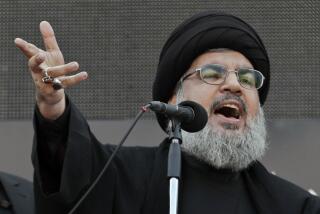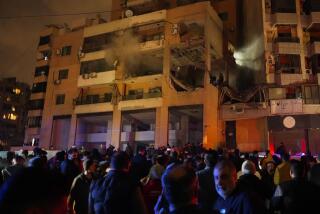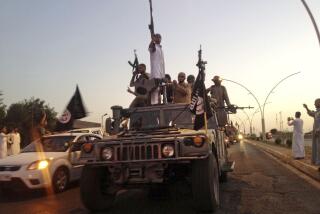Zarqawi May Have Spawned an Army of Admirers
- Share via
PARIS — Although Abu Musab Zarqawi made a name for himself with savage exploits in Iraq, he spent years building a web of international connections that, combined with his flair for self-promotion, had a profound impact on Islamic extremism worldwide.
Accused of attacks and plots from Turkey to Germany to Jordan, the man slain Wednesday in a U.S. airstrike in Iraq established himself among militants as a consummate man of action. His death will undermine his network’s recent efforts to forge international alliances and redeploy fighters from the Iraqi battle zone to strike targets in Europe, the Middle East and North Africa, said U.S. and European law enforcement officials.
But investigators said they worried that Zarqawi’s enduring symbolic power would spur retaliatory attacks and make him a martyr for a generation of militants radicalized during the Iraq conflict, especially in Europe.
In contrast to Osama bin Laden and Ayman Zawahiri, the Al Qaeda leaders revered as religious sages and strategic thinkers, Zarqawi -- who was responsible for bombings and beheadings -- honed the simple, brutal and highly effective message of a former gangster-turned-pitiless warlord, investigators said.
“His image has had a huge impact on radicalization and recruitment,” said a senior Italian anti-terrorism official who requested anonymity for security reasons. “In the intercepts of suspects, they constantly refer to him. He’s the hero, the man who fights with few weapons and few resources against the American monster in Iraq.
“The way they talk,” the official added, “you can practically see him on a horse with a scimitar. They talk more about him than Bin Laden or Zawahiri.”
The Jordanian-born militant’s death will test a vital nexus: the partnership between his group, Al Qaeda in Iraq, and the core remnants of Al Qaeda, experts said.
Even when he commanded his own training camp in western Afghanistan, Zarqawi kept a distance from the movement’s leadership.
Periodic tensions continued as he cultivated contacts in Chechnya, Syria and Iran, then surged to prominence in postinvasion Iraq.
About a year ago, however, Zarqawi reached a rapprochement with Bin Laden and Zawahiri that gave new momentum to their shared campaign against the West, officials said.
“The big unknown is the extent to which he was crucial to the network and to the relationship with Al Qaeda generally,” a British anti-terrorism official said.
“In the alliance between Bin Laden’s network and Zarqawi’s, it would seem the survival of those individuals is very central, the relationship between the two men and the people around them. You are dealing with such big figures.”
As part of his larger strategy, Zarqawi had recently ratcheted up efforts to move experienced fighters in Iraq back to their home countries, both to launch attacks in those nations and to recruit, train and raise money. Saudis, Syrians and North Africans dominate the ranks of foreign militants in Iraq, along with an increasing number of Europeans, officials say.
The exodus of fighters from Iraq grew after a publicized exchange of statements in which Bin Laden and Zawahiri urged Zarqawi to stop targeting Shiite Muslim sites and innocent women and children and to bring the battle to the West on other fronts, experts said.
Suicide bombings at three Jordanian hotels in November, which killed 60 people, showed that Zarqawi had heeded the advice.
In Iraq, both Zarqawi and U.S.-led coalition officials have been accused of exaggerating his stature. Zarqawi sought to promote himself; analysts say coalition officials found it politically expedient to blame the insurgency on a non-Iraqi.
Similarly in Europe and neighboring regions, the precise role and weight of Zarqawi as a leader of terrorism networks remains a subject of debate.
Because Iraq has become the front line for aspiring “holy warriors,” Zarqawi’s network served as a hub for extremist movements. Notably, he entered into an alliance with the Salafist Group for Call and Combat, a North African movement that during the last year has emerged as the most dangerous group targeting Europe.
French anti-terrorism officials say the Algeria-based group, known by its French initials GSPC, swore allegiance to Zarqawi last year, speeding a flow of its fighters to Iraq. Zarqawi reciprocated by killing Algerian diplomats in Iraq and denouncing France, the group’s foremost foreign target, officials say.
His network also provided explosives training to French GSPC militants at a hide-out in the Lebanese coastal city of Tripoli, French officials say.
Nonetheless, European investigators said the alliance did not mean Zarqawi had assumed command of the North African group, which retains considerable autonomy both in the Iraq region and in its campaign against Europe.
Zarqawi was implicated in a number of plots. Turkish prosecutors say he oversaw the Syrian-Turkish cell that bombed synagogues and British institutions in Istanbul in 2003, attacks that point to the central role of Turkey and Syria in his movement.
A Jordanian court sentenced Zarqawi to death in absentia for plotting the assassination of a U.S. diplomat there in 2002.
Zarqawi’s lieutenants allegedly trained and dispatched Algerians who were arrested in 2002 and 2003 on suspicion of plotting chemical and biological attacks in France and Britain, where one of the suspects stabbed a police detective to death.
In other cases, such as the Madrid train bombings in 2004, police found ties to Zarqawi’s network but no proof of his involvement.
Zarqawi never succeeded in carrying out a terrorist strike in Western Europe, say U.S. and European investigators. German police broke up a plot in which there was strong evidence that he gave orders by telephone, a relatively primitive plan to attack Jewish targets with small arms and hand grenades in 2002.
Especially before Iraq provided Zarqawi with a lawless environment ideal for a multifaceted terrorism campaign, his methods and rhetoric tended to reflect his background as a poorly educated ex-convict, investigators say.
“You compare him to Bin Laden, Zawahiri or eight others from Al Qaeda, he comes off as a ghetto gang leader,” the senior Italian official said. “His contacts in Syria, in Iran, tended to be with gangster types and corrupt military and spies. There’s always the bandit aspect to him.
“It’s the media emphasis that really made him a global phenomenon,” the official said. “And his videos are more popular because he is pure action. Bin Laden is more boring.”
As Zarqawi evolved into a crafty leader, he groomed several successors to take over for him in Iraq, Europe and elsewhere, Western and Jordanian intelligence officials say. His core leadership included an inner circle of Jordanians and other aides, as well as separate structures consisting of locals in Iraq and Jordan.
Some intelligence officials said Zarqawi had designated at least one Saudi as a successor, perhaps for foreign operations, while also grooming Iraqis to take over in their country.
Many of Zarqawi’s senior commanders are in Lebanon and Syria, where he wielded extensive power, intelligence officials said.
Syria is the main gateway for foreign fighters headed to Iraq and a key logistical and financial base for his organization, officials said.
Syria’s role as a kind of haven makes it more difficult to monitor the network and the rise of a successor, the officials said.
Some experts predicted Zarqawi’s death would bring revenge attacks. They worry less about his direct followers in and around Iraq than about the thousands of militants on the streets of Europe, North Africa and the Middle East who have no direct links to his network but have been inspired by a bloody odyssey that led to a bloody death.
“I worry that someone will want to take his place and be more violent than him,” veteran Italian anti-terrorism prosecutor Stefano Dambruoso said. “There’s the risk that they want to show they are crueler than him and attack either in Iraq or in Europe.... There’s the risk they try an action to show that terrorism isn’t dead.”
*
Rotella reported from Paris and Meyer from Washington.
More to Read
Sign up for Essential California
The most important California stories and recommendations in your inbox every morning.
You may occasionally receive promotional content from the Los Angeles Times.













